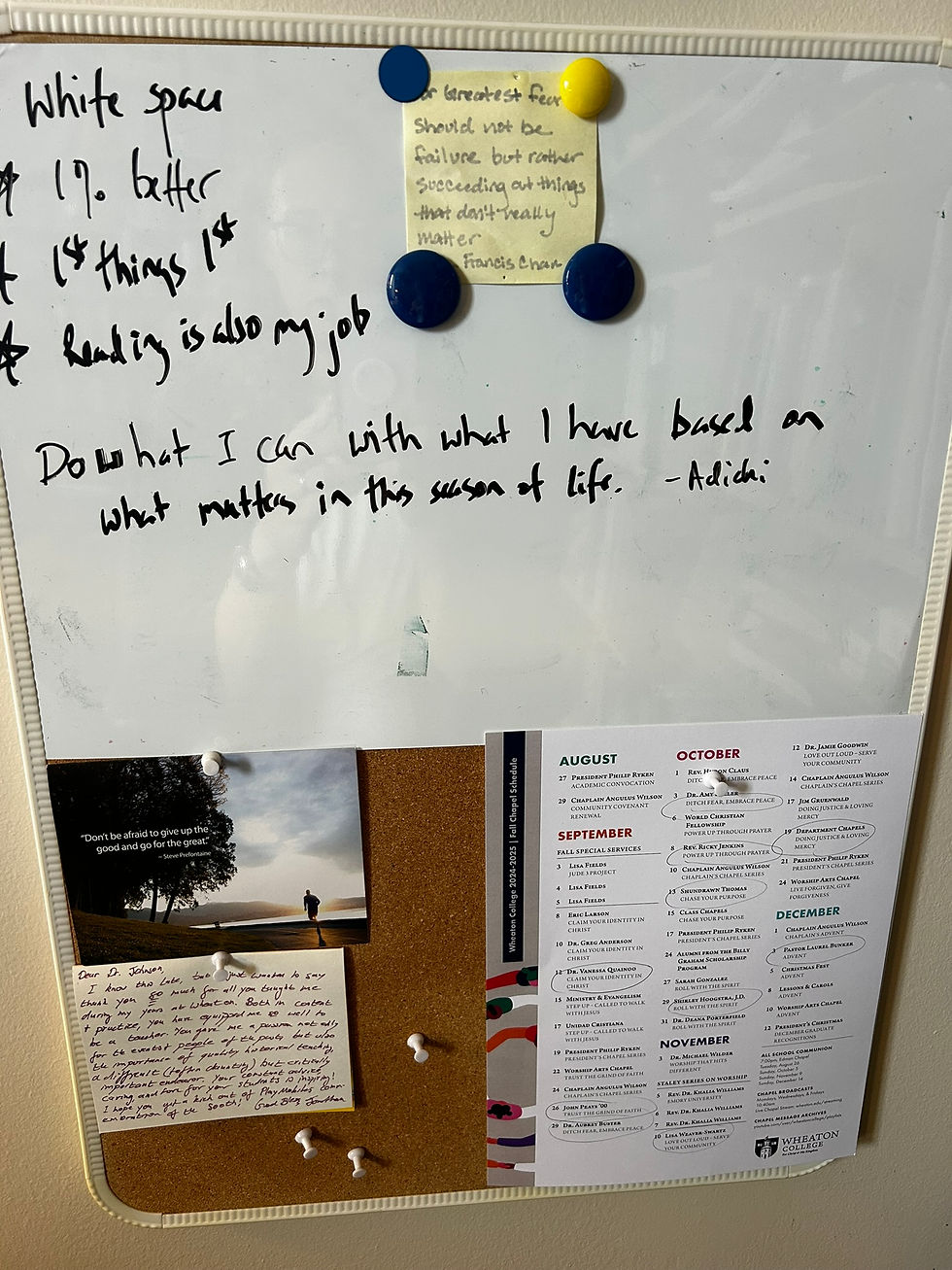The Precious Gift: Embracing Attention for Others and Ourselves
- karenjohnson52
- Sep 9, 2025
- 3 min read
Say no to the good so you can say yes to the best. Or, as a quote on my bulletin board from Steve Prefontaine says, "Don't be afraid to give up the good to go for the great." This is common knowledge and I think it's profound. But it can be so hard to do. I'm thinking about what I actually want to be great in, how to discern what to say yes to, and the extent to which I assume that more is better.
I keep thinking about how there is beauty in taking things away, which is a new idea for me that came from reading Arthur Brooks's From Strength to Strength this summer. He argues that westerners think about art as adding to a canvas, while easterners see art as removing excess to reveal what is truly there (art friends, I'm sure this breaks down…). But the point is interesting--do I want to add more to my life, or do I want to strip away the unessential so I can focus on the best? Brooks calls for the latter. He eschews bucket lists and instead calls readers to discern the most essential things and focus on those. This was new to me, as I've always been a bucket list, set goals type of person.

This posture can shape not only what we choose to focus on but also how we structure our days. Juliet Funt, the founder of White Space, argues that for organizations and people to function at their best, they need "white space" to reflect on what happened in that last meeting, etc. (I came across this idea on Craig Groeschel's leadership podcast). I've been trying to incorporate white space into my days to help me be more mindful. I'm putting up notes to remind myself. In these first two weeks of class, I've been taking about five minutes after class to write what happened and to reflect on what went well, what the students are wondering, and how to build on what actually happened for the next class. It's been a powerful practice, but like many things, I wonder if it is sustainable.
All of this adding to our lives is compounded by social media. In a Christianity Today article that narrated an interview between Russell Moore and Nicholas Carr about AI, they discussed how scrolling (as maybe you're doing!) teaches us to not give sustained, deep attention to things. Since there are too many things demanding our attention, we give little attention to many things. They pondered how if we do less, engage with fewer ideas, then we can ponder if they're worthwhile and what their significance is. I would add, if we give our attention to fewer things, we can focus on the people in front of us. I came across this quote by Thich Nhat Hanh, a monk and activist who seemed to get in all sorts of (good) trouble that I've been remembering as I interact with my family: "The most precious gift we can offer anyone is our attention. When mindfulness embraces those we love, they will bloom like flowers."
Carr and Moore are calling us to do the deep work Cal Newton calls for in his book Deep Work . Newton argues that to work well, we need time to do the slow labor it demands. And it feels better to do that deep work than to be responding to emails all day, or to be in response mode. I admit, there's a part of me as a working mom that resists Newton's argument. I am blessed to be able to care for my family--do the dishes, help with homework, put people to bed--and cannot, as Newton describes, read for a few hours in the evenings. But his point is still relevant. To do careful work, we need to give it our sustained attention.
I think my academic work, like Ordinary Heroes of Racial Justice, is the result of this sustained attention. It took years to research and write. Archival work requires long attention and discernment, sifting through what matters and what doesn't. Writing, too, demands focus; I loved paying close attention to how I wrote a phrase or what someone was actually saying. I want my life to be characterized by this careful attention. How do you do this?


Comments